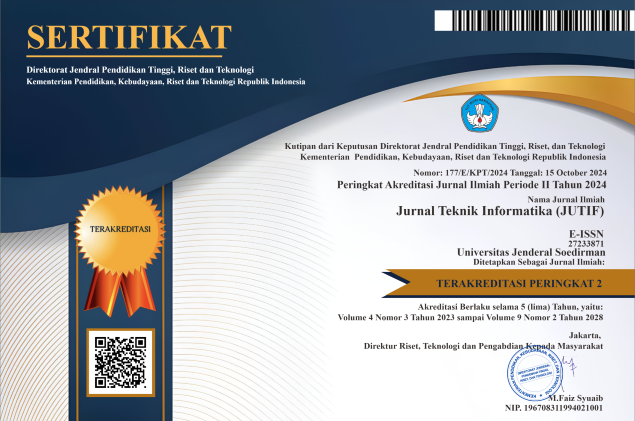ONLINE LEARNING SYSTEM ACCEPTANCE BY INDONESIAN HIGH SCHOOL STUDENTS DURING THE COVID-19 PANDEMIC WITH UTAUT
DOI:
https://doi.org/10.20884/1.jutif.2022.3.3.347Keywords:
COVID-19 Pandemic, High School Students, Online Learning System, Structural Equation Modeling, Unified Theory of Acceptance and Use of TechnologyAbstract
The Covid-19 outbreak that spread rapidly around the world including in Indonesia, has affected various fields, one of which is education. The government’s policy concerning PSBB forced the schools to change th learning process into online learning. However, there are factors to consider in its application, one of which is student acceptance of the learning method. This study was conducted with the participation of 437 Indonesian high school students in Indonesia. The analysis was conducted using the Structural Equation Modeling (SEM) method, with the Unified Theory of Acceptance and Use of Technology (UTAUT) acceptance model serving as the theoretical framework and being supplemented by three new exogenous variables. The findings suggest that the additional variable Perceived Enjoyment is the most influential factor on the acceptance of online learning systems among Indonesian high school students during the COVID-19 pandemic. In addition, of the four original exogenous variables in UTAUT, only Effort Expectancy and Facilitating Condition play a significant role in increasing students' intention to continue adopting online learning systems. The findings from this study can serve as a guide for secondary school online learning policies, even after the pandemic has ended.
Downloads
References
Levani, Prastya, and Mawaddatunnadila, “Coronavirus Disease 2019 (COVID-19): Patogenesis, Manifestasi Klinis dan Pilihan Terapi,” J. Kedokt. dan Kesehat., vol. 17, no. 1, pp. 44–57, 2021, [Online]. Available: https://jurnal.umj.ac.id/index.php/JKK/article/view/6340
R. Nasruddin and I. Haq, “Pembatasan Sosial Berskala Besar (PSBB) dan Masyarakat Berpenghasilan Rendah,” SALAM J. Sos. dan Budaya Syar-i, vol. 7, no. 7, 2020, doi: 10.15408/sjsbs.v7i7.15569.
R. D. P. Putri and S. Suyadi, “Problematika Pembelajaran Daring dalam Penerapan Kurikulum 2013 Tingkat Sekolah Dasar,” J. Basicedu, vol. 5, no. 5, pp. 3912–3919, 2021.
A. R. Pratama, “Fun first, useful later: Mobile learning acceptance among secondary school students in Indonesia,” Educ. Inf. Technol., vol. 26, no. 2, pp. 1737–1753, 2021, doi: 10.1007/s10639-020-10334-w.
L. Sofyana and A. Rozaq, “Pembelajaran Daring Kombinasi Berbasis Whatsapp Pada Kelas Karyawan Prodi Teknik Informatika Universitas Pgri Madiun,” J. Nas. Pendidik. Tek. Inform., vol. 8, no. 1, p. 81, 2019, doi: 10.23887/janapati.v8i1.17204.
U. A. Chaeruman, PEDATI: Model Desain Sistem Pembelajaran Blended, vol. 53, no. 9. 2017. doi: 10.13140/RG.2.2.15595.90408.
P. Y. Chen and G. J. Hwang, “An empirical examination of the effect of self-regulation and the Unified Theory of Acceptance and Use of Technology (UTAUT) factors on the online learning behavioural intention of college students,” Asia Pacific J. Educ., vol. 39, no. 1, pp. 79–95, 2019, doi: 10.1080/02188791.2019.1575184.
F. H. ZAWAIDEH, “Acceptance Model for e-Learning Services: A Case Study at Al-Madinah International University in Malaysia,” Int. J. Acad. Res. Accounting, Financ. Manag. Sci., vol. 7, no. 2, pp. 14–20, 2017, doi: 10.6007/ijarafms/v7-i2/2785.
R Core Team, “R: A language and environment for statistical computing. R Foundation for Statistical Computing,” Vienna Austria, 2020. https://www.r-project.org/
RStudio Team, “RStudio: Integrated Development for R. RStudio,” PBC, Boston, MA, 2020. http://www.rstudio.com/.
Y. Rosseel, “lavaan : an R package for structural equation modeling and more Version 0 . 5-12 ( BETA ),” vol. 12, 2012.
Junaidi, APLIKASI AMOS dan STRUCTURAL EQUATION MODELING (SEM). 2021.
A. M. Momani, “The unified theory of acceptance and use of technology: A new approach in technology acceptance,” Int. J. Sociotechnology Knowl. Dev., vol. 12, no. 3, pp. 79–98, 2020, doi: 10.4018/IJSKD.2020070105.
D. Sekarini, “Faktor Penerimaan Pengguna pada E-Learning dari Perspektif Siswa Sekolah Dasar Berbasis UTAUT Model,” JATISI (Jurnal Tek. Inform. dan Sist. Informasi), vol. 8, no. 4, pp. 1693–1709, 2021, doi: 10.35957/jatisi.v8i4.1257.
B. A. Akinnuwesi et al., “A modified UTAUT model for the acceptance and use of digital technology for tackling COVID-19,” Sustain. Oper. Comput., vol. 3, no. November 2021, pp. 118–135, 2022, doi: 10.1016/j.susoc.2021.12.001.
R. R. Tussardi, B. M. Izzati, and M. Saputra, “Analysis of E-Learning Acceptance During Distance Learning Using Unified Theory Of Acceptance and Use of Technology (UTAUT),” JATISI (Jurnal Tek. Inform. dan Sist. Informasi), vol. 8, no. 2, pp. 465–479, 2021, doi: 10.35957/jatisi.v8i2.767.
A. R. Pratama and F. M. Firmansyah, “Disengaged, Positive, or Negative: Parents’ Attitudes Toward Learning From Home Amid COVID-19 Pandemic,” J. Child Fam. Stud., vol. 30, no. 7, pp. 1803–1812, 2021, doi: 10.1007/s10826-021-01982-8.
O. Sulaymani, A. R. Pratama, M. Alshaikh, and A. Alammary, “The Effects of Previous Experience and Self Efficacy on the Acceptance of e-Learning Platforms Among Younger Students in Saudi Arabia,” Contemp. Educ. Technol., vol. 14, no. 2, 2022, doi: 10.30935/CEDTECH/11524.



























